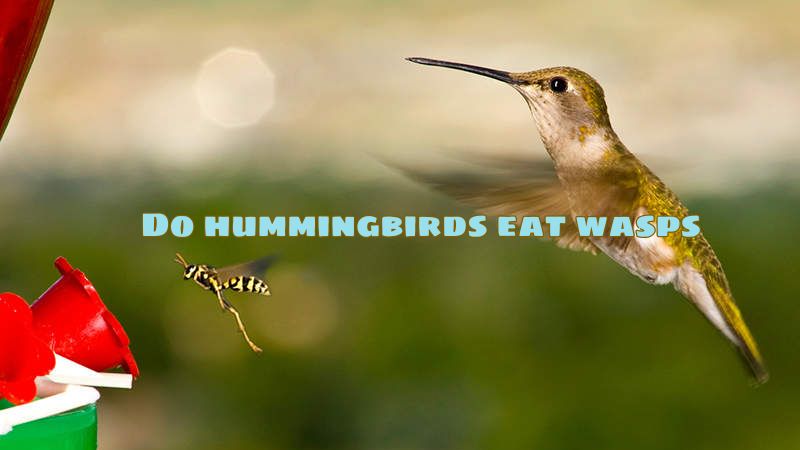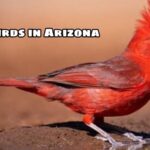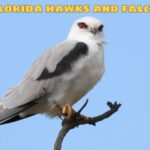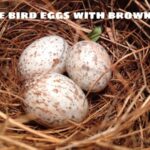Do hummingbirds eat wasps? Hummingbirds are small birds known for their fast flight and ability to hover in mid-air. They are most commonly known for drinking nectar from fresh flowers, but hummingbirds also eat small insects. This raises the question of whether hummingbirds eat larger, more dangerous insects, such as wasps. Here, birdsofjoy.com shares some important information about hummingbirds and their interactions with bees and wasps.
Hummingbird feeding habits
Hummingbirds have adapted to a high-energy diet to sustain their rapid wing-flapping and lightning-fast movements. They primarily forage for sweet nectar from a variety of flowers, which provides the quick energy they need. In addition to nectar, these tiny birds also incorporate insects into their diet, providing them with essential proteins.
Here are some details about hummingbird feeding habits:
Nectar is the cornerstone of the hummingbird diet, serving as a quick source of energy that is vital for their high metabolism.
They are particularly fond of brightly colored flowers, which are often a sign of a rich nectar source.
Insects such as fruit flies, midges, and small beetles are consumed for protein, which aids in muscle maintenance and feather growth.
While foraging, hummingbirds may accidentally swallow small insects, but that is not their primary purpose for foraging.
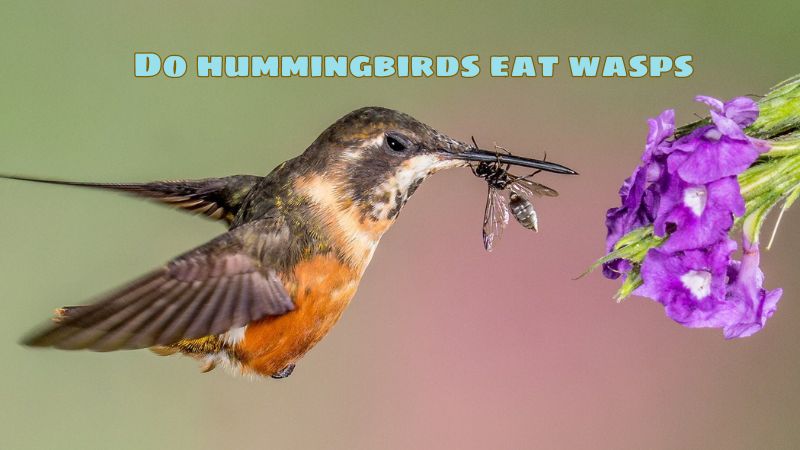
Misconceptions about hummingbirds eating bees and wasps
When observing hummingbirds hovering around flowers and feeders, it is easy to mistake their behavior for predatory behavior or interactions with bees and wasps in the ecosystem. This can lead to the misconception that hummingbirds eat bees and wasps. In fact, these birds are more focused on finding nectar than hunting these stinging insects. Bees and wasps can be a part of a hummingbird’s environment, often because they are attracted to the same sweet nectar, not because they are a food source.
Let’s clear up some common dietary misconceptions about hummingbirds and the presence of bees and wasps:
Hummingbirds do not intentionally eat bees and wasps; their relationship is primarily one of competition for nectar.
These birds rely on the quick energy from nectar rather than the risky effort of hunting bees and wasps.
Bees and wasps can be considered competitors rather than prey in the hummingbird ecosystem. The rapid movement of hummingbirds around flowers can create the illusion of hunting when in fact they are foraging for nectar.
Do hummingbirds eat wasps?
Hummingbirds do not eat wasps. Hummingbirds primarily eat nectar, but they also eat small insects such as flies, mosquitoes, and spiders for protein. Wasps, due to their large size and powerful defenses, are not prey for hummingbirds. Instead, hummingbirds tend to stay away from wasps and other venomous insects to avoid being attacked.
Hummingbird Protection and Bee/Wasp Management at Feeders
For hummingbird enthusiasts who want to maintain a safe and comfortable environment for these birds, keeping bees and wasps away from feeders is important. You can do this without harming the birds by using strategic measures. Consider a feeder without yellow accents, as the color can attract bees, and maintain cleanliness to prevent the smell of old nectar from attracting wasps and bees.
Check out these practical tips for managing bees and wasps at hummingbird feeders:
Avoid yellow feeders, as yellow attracts bees; instead, opt for red feeders, which are less attractive to bees but still attract hummingbirds.
Install bee guards over feeders so hummingbirds can feed while still preventing bees and wasps from accessing the nectar.
Regular feeder maintenance is important — clean feeders regularly to prevent the buildup of old fermented nectar that attracts insects.
Move the feeder periodically to prevent bees and wasps from becoming regular visitors to a particular location. If necessary, use insect traps, but place them away from the feeder to attract bees and wasps to other areas.
Conclusion
Although hummingbirds eat a variety of insects for their nutrition, wasps are not on their diet. Because of their large size and ability to defend themselves with venom, wasps are more of a threat than a prey for hummingbirds. Instead, hummingbirds choose safer, easier prey, maintaining a diet that is appropriate to their size and needs.

